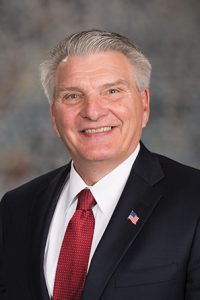Tax incentive for workforce housing construction stalls
A bill that would allow certain cities to use tax increment financing (TIF) to support the construction of workforce housing stalled after a failed cloture motion May 16.
Introduced by Gering Sen. John Stinner, LB496 would authorize cities of the first and second class and villages to include the construction of single-family or multi-family housing as part of a redevelopment project eligible for TIF.
Stinner said TIF and a 1991 law authorizing cities to use local sales and property tax revenue for certain economic development projects currently are the only significant tools cities and villages have to boost economic growth.
The bill would require a municipality to conduct a housing study, prepare an incentive plan for the construction of housing meant for new or existing workers and hold a public hearing on the plan.
After the hearing, the municipality would be required to determine that the plan is necessary to prevent the spread of blight and substandard conditions within the municipality, will promote additional safe and suitable housing for people employed there and will not result in the unjust enrichment of any individual or company.
Sen. Curt Friesen of Henderson opposed the bill, saying that it would divert property tax revenue from public schools, natural resources districts and other entities. It also would distort a community’s property valuations and make it difficult for builders that do not use TIF to compete with those that do, he said. Friesen said he supports the use of TIF for residential projects only if it is used for infrastructure such as streets and sewer systems.
“Now we’re taking it one step further and we’re starting to subsidize the building itself,” he said. “And that’s where I think we take the wrong direction.”
Friesen introduced an amendment that would allow only the property taxes collected by a city or village to be diverted for the construction of a workforce housing project using TIF.
Sen. Mike Groene of North Platte also opposed the bill, saying that it is designed to help developers maximize their profits. He said his constituents are asking for property tax relief, not additional housing.
“Do you care how [LB]496 looks to the landowners out there and the average property tax payer?” Groene said. “You are giving an incentive in tough times to an industry [in which] every contractor is fully employed.”
Sen. Matt Williams of Gothenburg supported the bill, saying that TIF helped draw four Fortune 500 companies to the Gothenburg area. He said using TIF for housing projects is intended to benefit communities, not increase profits for bankers and realtors.
“I have yet to see a case where anyone has seen any unjust enrichment from a [TIF] project,” Williams said.
He also filed an amendment that would define workforce housing as an owner-occupied home that costs no more than $275,000 to build or a rental housing unit that costs no more than $200,000 to build. The definition was used in other legislation passed this session.
Stinner filed a motion to invoke cloture, or cease debate and vote on the bill and pending amendments. It failed 32-9. Thirty-three votes were needed.
The bill is unlikely to be scheduled for further debate this session.


